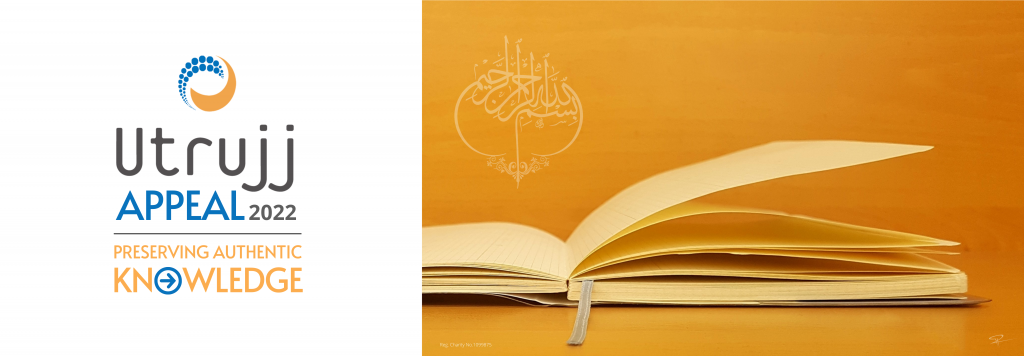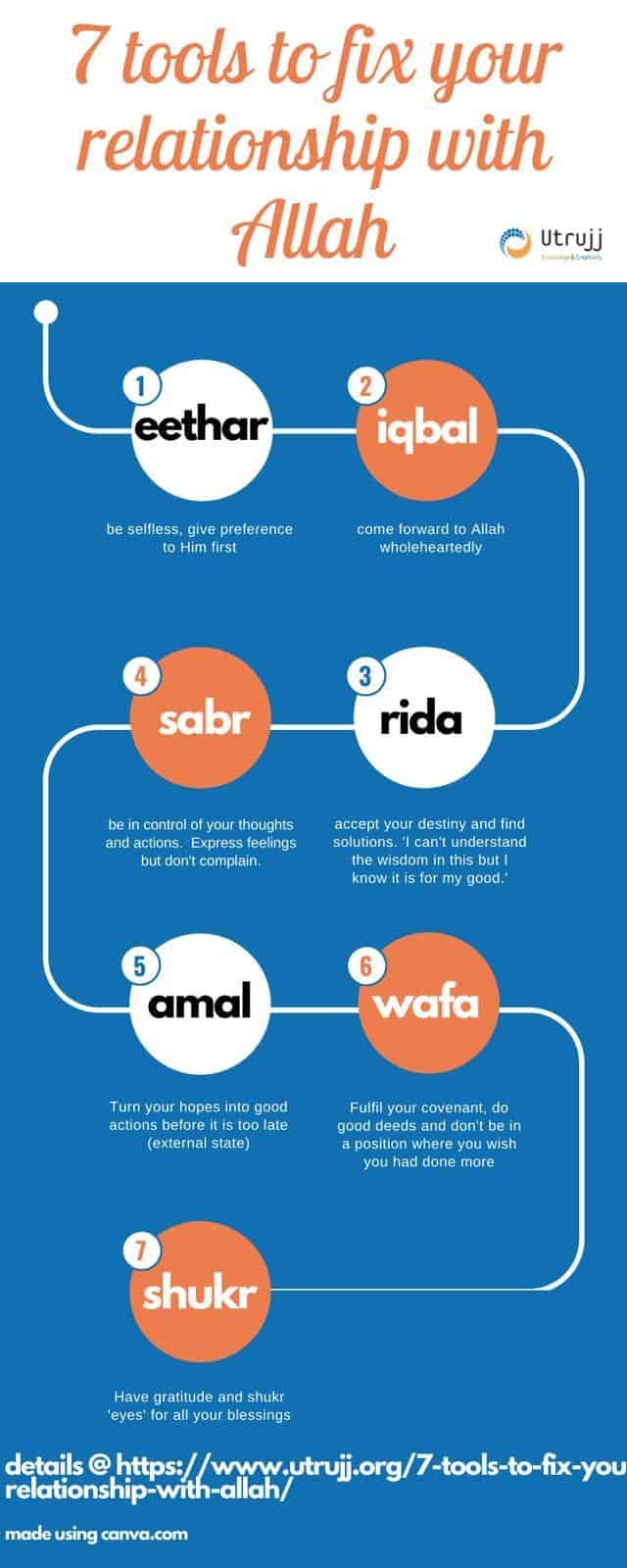7 tools to fix your relationship with Allah

In his book, Adab an Nufus, Imam al Muhasibi (d.243H) writes on different topics related to the control of the nafs, the lower self, and its cravings, urges and desires. How to improve it and purify it. Imam Al-Muhasibi, a master in this field, wrote from his experience.
In this chapter he focused on how to rectify your relationship with Allah Almighty. He started this chapter by saying that:
a wise-man wrote a letter to his brother
and in that letter he gave him a piece of advice. Usually when he speaks of a ‘wiseman’, he is referring to himself, but does not want to say that he wrote to his brother to give him advice. In this letter he said:
I advise you, my brother, to fix what is between you and Allah, and to put what Allah loves before what you love. Then do your actions for Him wholeheartedly for Allah, for it is Him, whom you need the most.
1. Selflessness – Eethaar
Muhasibi’s advice is practical, rather than theoretical. He tells us in this very deep statement that to improve our relationship with Allah Almighty we need do ‘eethaar’, which means to give preference to others over yourself.
An example of eethaar is to give priority to your guest, even when you are needy. The Ansar (the people of Madinah) showed generosity to the migrants from Makkah, whom they welcomed with open arms. Even when they had limited food, they would give it to their guests without letting them know that they had done this. And in one instance, the family kept the light dim so that their guests would not know that they had gone hungry. Allah Almighty revealed this and praised them for this selflessness in Surah Hashr:
And [also for] those who were settled in al-Madinah and [adopted] the faith before them. They love those who emigrated to them and find not any want in their breasts of what the emigrants were given but give [them] preference over themselves, even though they are in privation. And whoever is protected from the stinginess of his soul – it is those who will be the successful. (59:9)
Generosity is the opposite of what we have witnessed by some people in response to the coronavirus, as they squabble in supermarkets or the reported increase in piracy, as ships are being attacked for their cargo.
Some of you might say it is a matter of life and death, not a time to be generous, but a time for survival. This is barbaric. We also saw in Italy, people burning the flag of the European Union as they felt abandoned by their fellow states to their grim situation and in their hour of need.
Imam Muhasibi is saying do eethaar (give preference) to what Allah loves over what you love. Embrace the actions which make you closer to Allah Almighty because you need Him. and He doesn’t need you.
2. Engage in actions whole-heartedly – Iqbal
Iqbal is another term which has depth. Aqbala means to come forward and to do something wholeheartedly, not just provide lip-service. (The name Iqbal means the one who comes closer to Allah without reluctance).
There are two kinds of actions – those you do for the sake of ticking the box- 4 rakahs, wudu. But where is the box for your heart? You have not ticked the box for the heart. You were busy focusing on the outward actions, yet your heart was not engaged.
The opening dua before you start your salah is the Dua al Istiftah.
The Hanafi version we are familiar with is recited before Surah Fatihah:
Subhana Kal-lah hum-ma wabi hamdika wata-bara kasmuka wata’ala jad-duka wala ilaha ghyruka.
Glory be to you, O Allah, and all praises are due unto you, and blessed is your name and high is your majesty and none is worthy of worship but you.
In the other version we can say:
Wajjahtu wajhiya lil-lathi fatara as-samawati wal arda hanifan musliman wa ma ana minal mushrikeen. inna salati wanusuki wa mahyaya ma mamati lillahi rabbil alameen wa bi thalika umirtu wa ana minal muslimeen.
I have turned my face sincerely towards the Originator of the heavens and the Earth and I am not of those who associate (others with Allah). Indeed my prayer, my sacrifice, my life and my death are for Allah, Lord of the worlds, no partner has He, with this I am commanded and I am of the Muslims. (Imam Muslim)
This is the essence of iqbal, right at the beginning of the salah – we are pulling the pieces of our scattered self together – collecting the heart, the mind and faculties together and directing them towards the Creator. Our salah, our rituals, our sacrifice and life and death are FOR Allah. Anything we are doing, we are planning or preparing, or engaged in which is devoid of Allah is empty. It lacks Iqbal. As we need Allah and He doesn’t need us, our actions need this quality.
We hope that our actions will be accepted, but we need make the effort to have the presence of our heart and mind and body together. Actions based on just the body, do not carry the same weight.
3. Accept your destiny- rida (even when you dislike it)
Imam Al-Muhasibi posed a question to his brother, (most likely Al-Junayd al-Baghdadi), he asked him if he knew what it means to ‘fix what is between you and Allah’? Then he replied:
- Don’t send anything to Allah that does not please Him.
The word he used was rida (pleased with). So make sure you do not send forward the actions Allah Almighty does not approve of.
To Him ascend pure words (al-kalimu at-tayyib) and righteous deeds He elevates. (35:10)
2. Never receive anything from Him, without being pleased with it.
This means no matter how hard or bitter what He sends you, you have to take it with rida (acceptance and satisfaction). This doesn’t mean you don’t protect yourself, or take medicine or develop a vaccine. This is not the correct understanding. You try and find a solution, but you have an internal attitude which says, though I cannot understand the wisdom in this, I know it is for my good. You say ‘For sure I am pleased with what you have sent me.’
It is narrated on the authority of Al-‘Abbas b. ‘Abdul-Muttalib that he heard the Messenger of Allah saying:
He has found the taste of faith (iman) who is content with Allah as his Lord, with Islam as his religion (code of life) and with Muhammad (peace be on him) as his Prophet. (Muslim)
The one who tastes the sweetness of imaan is the one who accepts Allah as his Lord and Muhammad (peace be on him) as His Messenger, and Islam as his way of life. If you do all three of these, you will taste the sweetness of imaan.
If your life is bitter right now, you need to have rida (be pleased) first in order to get the sweetness. With rida, hardship is transformed to ease and anger is transformed to happiness. This may seem impossible and unattainable, but if you manage it, it leads to a high rank, rather than being on the margin.
4. Be patient – have sabr
Imam Muhasibi said if you cannot fully achieve acceptance in your heart, or you are not well pleased with everything you received from Allah, from His judgement or commands, then at least have sabr.
As not all people can achieve satisfaction with this, the bare minimum is sabr.
Sabr is not complaining and sharing your pain. It is to control what you say, do, think and feel. Don’t misunderstand, controlling emotions doesn’t mean you don’t express your emotions. When the baby Ibrahim of the Prophet (peace be on him) passed away, the tears rolled down his cheek and his companions were surprised, yet he never uttered a word of complaint. As he took his last breaths, the eyes of Allah’s Messenger started shedding tears and Abdur Rahman bin ‘Auf said:
‘O Allah’s Messenger (peace be on him), even you are weeping!’
He (peace be on him) said, ‘O Ibn ‘Auf, this is mercy’.
Then he (peace be on him) wept more and said, ‘The eyes are shedding tears and the heart is grieved, and we will not say except what pleases our Lord. O Ibrahim! Indeed, we are grieved by your separation’. (Bukhari).
The gap between theory and the practice
Among the six pillars of imaan, we have to believe in destiny the good and bad of it, is also part of rida. We believe in qadr in theory, but when we are hit by it, we often react to it with anger or bitterness or questioning. Yet Allah Almighty is asking us to practice rida.
Allah is pleased with them and they are pleased with Him. (5:119)
In the intense grief she felt following the passing of her beloved husband, she remembered the dua she had heard from the Prophet Muhammad (peace be on him).
Umm Salama, who later married the Prophet (peace be on him) narrated:
I heard the Messenger of Allah (peace be on him) saying, ‘When a person suffers from a calamity and utters: ‘Inna lillahi wa inna ilaihi raji’un. Allahumma ujurni fi musibati, wakhluf li khairan minha (We belong to Allah and to Him we shall return. O Allah! Compensate me in my affliction, recompense my loss and give me something better in exchange for it), then Allah surely compensates him with reward and better substitute. (Muslim)
We are taught by this example, that when we are hit by hardship, the first response is to acknowledge that everything belongs to Allah and will return to Him, and the second is to ask Allah to reward us for the test and to replace our loss with something better.
Abu Musa Al Ash’ari (may Allah be pleased with him) reported that the Messenger of Allah (peace be on him) said:
When a man’s child dies, Allah, the Exalted, asks His angels, ‘Have you taken out the life of the child of My slave?’ and they reply in the affirmative. He then asks, ‘Have you taken the fruit of his heart?’ and they reply in the affirmative. Thereupon He asks, ‘What did my slave say?’ They say: ‘He praised You and said: Inna lillahi wa inna ilaihi raji’un (We belong to Allah and to Him we shall return).’ Allah says: ‘Build a house for my slave in Jannah and name it Baitul-Hamd (the House of Praise). (Tirmidhi)
Of course it is difficult to do this. Such a reaction doesn’t come naturally or overnight. It needs training and people are at different levels. Some will take less time than others, some will find it harder.
If you want Allah’s rida, it is interlinked with your rida. The moment you accept Allah’s destiny you get Allah’s rida.
When the servant is afflicted by calamities the angels report your response back to Allah. When He sends a tough test, He knows of course what you do and say. When He responds with inalillahi Allah sends Him something beyond his imagination, because he did not object to Allah’s destiny. Conversely, Allah Almighty is displeased with the one who was complaining and denying Allah during his calamity.
Allah Almighty doesn’t need to test us to know our quality, but this test shows us ourselves. It shows us the strongest parts of our imaan and the weakest. It exposes us to ourselves and those around us. Often we are surprised by who breaks under pressure, and who is strong. It often defies your expectations.
When I went on Hajj, (may Allah lift this calamity and enable people to go on Hajj and Umrah again), we had a couple, where the wife had a chronic disease and was on a wheelchair. Her husband was a military man, and had been training hard physically before Hajj to prepare for it. He thought he would be carrying her, because of his expertise and training, but when the time came he has fallen ill and was so weak, that his wife came out of her wheel chair and supported her husband instead. We are often over confident about ourselves. And then we are defeated from the place we least expect. Don’t be fully reliant on your own power and preparation at all.
5. Act before it is too late – amal
Imam Muhasibi said:
You should know that your days are numbered.
You have one shot. You have only one soul. As you have the opportunity, you should use it in the best way. When your days end, you will not be able to come back. You have only one shot. You have one target. So don’t miss your shot. Hit the target.
In Surah Muminoon, Allah Almighty says:
[For such is the state of the disbelievers], until, when death comes to one of them, he says, ‘My Lord, send me back, That I might do righteousness in that which I left behind.’ No! It is only a word he is saying; and behind them is a barrier until the Day they are resurrected. (23:99-100)
People will wish for another chance to go back, but when their days end, they cannot return. When time’s up, it’s up. There is no other chance. Usually, when you miss a train, you wait for the next one. But when your soul is taken away you don’t have a second soul. It was narrated from Jabir bin ‘Abdullah (May Allah be pleased with him) that:
When ‘Abdullah bin ‘Amr bin Haram was killed, on the Day of Uhud, the Messenger of Allah (peace be on him) said: ‘O Jabir, shall I not tell you what Allah said to your father?’ I said: ‘Yes.’ He said: ‘Allah does not speak to anyone except from behind a screen, but He spoke to your father face to face and said: ‘O My servant, ask Me and I shall give you.’ He said: ‘O my Lord, bring me back to life so that I may be killed for Your sake a second time.’ He said: ‘I have already decreed that they will not return (to the world after death).’ He said: ‘O Lord, convey (the good news about my state) to those whom I have left behind.’ So Allah revealed this Verse: ‘Think not of those as dead who are killed in the way of Allah.’ (3:169)
Translate your hopes into actions before it is too late.
6. Fulfil your covenant with Allah – Wafa’
We see this very clearly today, as people are being admitted to hospital in large numbers. We do not know who is next. May Allah give shifa to all those who are ill. Ya Allah give cure to those who are ill.
Our days are few. So few that we can count them. Even if we are in our 90s they are still very few compared to the akhirah. If this is the case, then it is clear that time is limited. Yet with this limitation, we have too many things to do, so what should we do? We have very few days in the dunya and our list of tasks is long. What is the first priority? This is what we need to do now. Because time is limited and we don’t get a second chance. We don’t want to leave this world with regrets – ‘I wish I had done this or that’.
Some people in jannah will ask Allah to bring them back. Allah Almighty will ask them if they want anything and they will say they want to return to dunya to do more good deeds. And these people were martyrs, who died for the sake of Allah, and they will wish to return to dunya so they can die for Him again. Allah Almighty will say that He promised that He would not return anyone back to dunya.
Fulfilling your convenant isn’t always easy, so acknowledge your weakness. Don’t be overwhelmed by your expertise or strength.
7. Have gratitude – shukr
Always remain grateful to Allah. Whatever your situation, there is always someone worse off than you. And there is always much to be grateful for. It is about having shukr-eyes, so you can see the blessings around you.
In his letter, Imam Muhasibi, therefore showed us the 7 tools to fix our relationship with Allah.
1-Eethār: Give preference to Allah first
2-Iqbāl: Come forward to Allah wholeheartedly
3- Rida: Accept your destiny (This is an internal state)
4-Sabr: Have patience
5-Amal: Do good actions (This is an external status)
6-Wafa’: Fulfill your covenant with Him
7-Shukr: Have gratitude.
May Allah enable us to come close to Him and may He be pleased with us, in every situation. Ameen.
Online Tarbiyya Session 5th April 2020
Based on Adab an Nufus (The Etiquette of the Souls) by Imam al Harith Muhasibi, (781–857) who was the founder of the Baghdad School of Islamic philosophy, including the Sufi masters Junayd al Baghdadi and influenced many subsequent theologians, such as al Ghazali. It is a simple guide to spirituality from the third century scholar whose nickname Mushasibi (the one takes account) specialised in introspection, and moral and spiritual development.
- Why should you follow up one good action with another one?
- Don’t be a Ramadani person – Be a Rabbani person.
- How do you pray Salat al-Kusuf – the prayer during a solar eclipse
- The test of will – Tarawih Reflections 30
- Why humans can’t be gods – Tarawih reflections 29

Recommended Posts

Don’t be a Ramadani person – Be a Rabbani person.
April 10, 2024

The test of will – Tarawih Reflections 30
April 09, 2024



